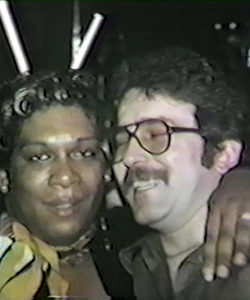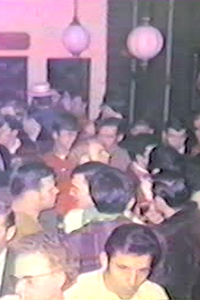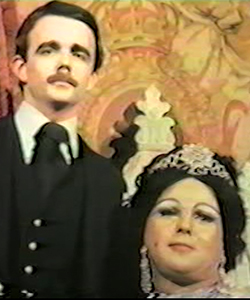Carnegie Mellon's Pittsburgh Queer History Project Presents its First Exhibit, "Lucky After Dark"
Running May 30 - June 29 at Future Tenant Gallery, the Exhibit Explores Gay and Lesbian Nightlife in Pittsburgh from 1960-1990
Contact: Shilo Rea / 412-268-6094 / shilo@cmu.edu


 PITTSBURGH—The Pittsburgh Queer History Project, an oral history and media preservation initiative directed by Carnegie Mellon University's Harrison Apple and Tim Haggerty, will present its first exhibit, "Lucky After Dark: Gay and Lesbian Nightlife in Pittsburgh, 1960-1990," from May 30 through June 29 at Future Tenant Gallery.
PITTSBURGH—The Pittsburgh Queer History Project, an oral history and media preservation initiative directed by Carnegie Mellon University's Harrison Apple and Tim Haggerty, will present its first exhibit, "Lucky After Dark: Gay and Lesbian Nightlife in Pittsburgh, 1960-1990," from May 30 through June 29 at Future Tenant Gallery.
"Lucky After Dark" will explore the role after-hours nightlife in postwar Pittsburgh played in establishing and shaping gay and lesbian identities. Apple, CMU's Center for the Arts in Society (CAS) artist-in-residence and a 2013 graduate of the BXA Intercollege Degree Programs, is the exhibit's curator. He founded the Pittsburgh Queer History Project after uncovering a wealth of information during his undergraduate research into queer urban archeology.
Paul Eiss, CAS director and associate professor of anthropology and history in the Dietrich College of Humanities and Social Sciences, called the work "one of the most impressive oral historical projects I've witnessed."
"I knew Harrison as a student in the Global Studies major, and his work as an artist, whether performance or visual, and as a historian has always blown me away," Eiss said. "He has a rare passion and diverse talents, and I feel privileged to have watched him work on 'Lucky After Dark.'"
Using unpublished archival material, oral interviews, photographs and material evidence, "Lucky After Dark" celebrates the social institutions that men and women developed in a period of discrimination and condemnation, and thoughtfully challenges existing interpretations and assumptions about the development of an LGBT (Lesbian, Gay, Bisexual and Transgender) culture in Pittsburgh.
"Invisibility still dominates the discussion of LGBT community formation in the 20th century," said Haggerty, director of the Dietrich College's Humanities Scholars Program and a leading expert on cultural roles for men and policy issues concerning sexuality. "Assumptions that 'gay life' evolved in San Francisco, New York or LA while smaller cities lagged behind or remained off-the-grid are rebuked by the example of Pittsburgh, where a subculture evolved in reaction to local conditions and opportunities."
The exhibit draws closely from the interviews with "Lucky," a club steward and bartender who became a key informant for the project, along with many other participants. Lucky's career paralleled a history of gay Pittsburgh and his extensive collection of photographs, videos, publications and ephemera from various social clubs vividly illustrate the gay world after dark.
"After nearly two years of collecting, organizing and rudimentary indexing, I'm excited to re-engage a history of Pittsburgh — both to those who made it, and those of us in its wake," Apple said. "The Pittsburgh Queer History Project relies on storytelling, and 'Lucky After Dark' is only the beginning of an immense tale."
Future Tenant Gallery is at 819 Penn Ave. in downtown Pittsburgh. An opening party will be held from 6-9 p.m., on Friday, May 30. A photo identification session will be held from 6-9 p.m., Saturday, June 7, and a screening of the archival footage will take place from 6-9 p.m., Saturday, June 21. A closing party will be held from 6-10 p.m., Sunday, June 29, featuring music by DJ Alexis Icon and Visuals remixed from the archive by Kevin Ramser.
Funding for the "Lucky After Dark" exhibition was provided by the Pittsburgh Foundation's A.W. Mellon Educational and Charitable Trust Fund and the Scott Noxon Fund, and Carnegie Mellon's Frank-Ratchye Fund for Art @ the Frontier and the Humanities Scholars Program.
For more information, visit http://www.pittsburghqueerhistory.com.
###
The Pittsburgh Queer History Project's first exhibit, "Lucky After Dark," explores the role after-hours nightlife in postwar Pittsburgh (pictured above) played in establishing and shaping gay and lesbian identities.